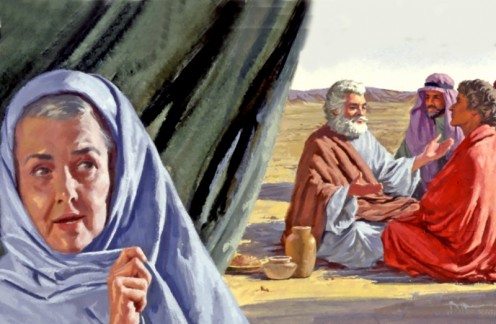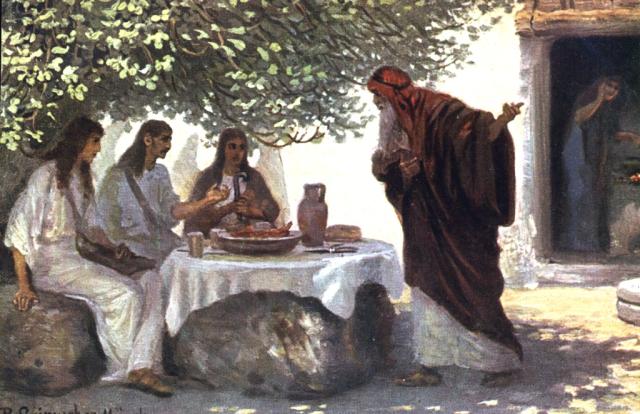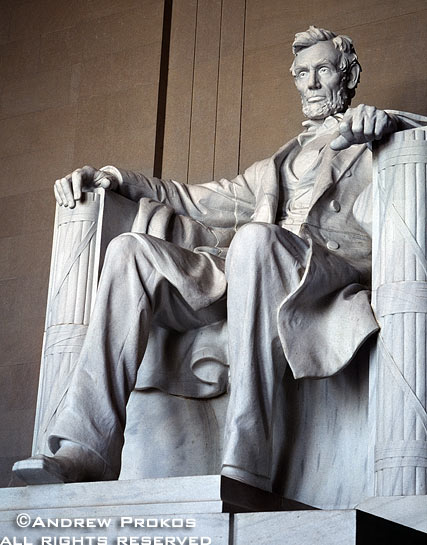This is the great, intriguing, dilemma God faces in how punish the sinner's sin, which, being righteous,
God, must indeed do. But, at the same time, providing eternal salvation to the repentant sinner as he/she
turns to God for redemption. The Gospel in the New Testament gives us the answer, that Jesus Christ
was conceived and born in complete innocence, having NO human father, and that he, being the Son of God was able to live a
sinless life, and voluntarily died an innocent, sacrificial, death. By God's reckoning, this innocence, or atonement, is
applied to completely pay for the sins of humans who embrace Jesus Christ by faith. Righteousness
is "imputed" to believers, all their sins and unrighteousness, are "covered." Sometimes Christians face dilemmas in that the New Testament exhorts us to submit to spiritual leaders. But what if their directions conflict with the will God as shown in the New Testament, or as they sense from the
indwelling Holy Spirit. The obvious solution would be to discuss it with the spiritual leader,
since they certainly don't want you to do wrong with the Lord. But, there are times when you cannot
come to agreement, and must make a hard decision. The Book of Romans, chapters 3 and 4,
sheds much light on how God has handled this dilemma, and how it worked in Abraham's life. |
 |
|
| Abraham and Sarah |

|
New Testament Book of Romans, chapter 3: 20 Therefore by the
deeds of the law there shall no flesh be justified in his sight: for by the law is the knowledge of sin. 21 But now the righteousness of God without the
law is manifested, being witnessed by the law and the prophets; 22 Even the righteousness of God which is by faith of Jesus Christ unto all
and upon all them that believe: for there is no difference: 23 For all have sinned, and come short of the glory of God; 24 Being justified freely by his grace through the redemption
that is in Christ Jesus: 25 Whom
God hath set forth to be a propitiation through faith in his blood, to declare his righteousness for the remission of sins
that are past, through the forbearance of God; 26 To declare, I say, at this time his righteousness: that he might be just, and the justifier
of him which believeth in Jesus. 27 Where
is boasting then? It is excluded. By what law? of works? Nay: but by the law of faith. 28 Therefore we conclude that a man is justified by faith without
the deeds of the law. 29 Is
he the God of the Jews only? is he not also of the Gentiles? Yes, of the Gentiles also: 30 Seeing it is one God, which shall justify the circumcision
by faith, and uncircumcision through faith. 31 Do
we then make void the law through faith? God forbid: yea, we establish the law. |
 |
|
| Abraham's mysterious visitors |

|
Chapter 4: 1 What shall we say then that Abraham our father,
as pertaining to the flesh, hath found? 2 For if Abraham were justified by works, he hath whereof to glory; but not before God. 3 For what saith the scripture? Abraham believed
God, and it was counted unto him for righteousness. 4 Now to him that worketh is the reward not reckoned of grace, but of debt. 5 But to him that worketh not, but believeth
on him that justifieth the ungodly, his faith is counted for righteousness. 6 Even as David also describeth the blessedness of the
man, unto whom God imputeth righteousness without works, 7 Saying, Blessed are they whose iniquities are forgiven, and whose sins
are covered. 8 Blessed
is the man to whom the Lord will not impute sin. 9 Cometh this blessedness then upon the circumcision only, or upon the uncircumcision also? for
we say that faith was reckoned to Abraham for righteousness. 10 How was it then reckoned? when he was in circumcision, or in uncircumcision?
Not in circumcision, but in uncircumcision. 11 And he received the sign of circumcision, a seal of the righteousness of the faith which he
had yet being uncircumcised: that he might be the father of all them that believe, though they be not circumcised; that righteousness
might be imputed unto them also: 12 And the father of circumcision to them who are not of the circumcision only, but who also walk
in the steps of that faith of our father Abraham, which he had being yet uncircumcised.
|
 |
|
| Abraham Lincoln |

|
13 For the promise, that he should
be the heir of the world, was not to Abraham, or to his seed, through the law, but through the righteousness of faith.14 For if they which are of the law be heirs,
faith is made void, and the promise made of none effect: 15 Because the law worketh wrath: for where no law is, there is no transgression. 16 Therefore it is of faith, that it might
be by grace; to the end the promise might be sure to all the seed; not to that only which is of the law, but to that also
which is of the faith of Abraham; who is the father of us all, 17 (As it is written, I have made thee a father of many nations,) before him whom
he believed, even God, who quickeneth the dead, and calleth those things which be not as though they were. 18 Who against hope believed in hope, that
he might become the father of many nations, according to that which was spoken, So shall thy seed be. 19 And being not weak in faith, he considered
not his own body now dead, when he was about an hundred years old, neither yet the deadness of Sarah's womb: 20 He staggered not at the promise of God
through unbelief; but was strong in faith, giving glory to God; 21 And being fully persuaded that, what he had promised, he was able also to perform. 22 And therefore it was imputed to him for
righteousness. 23 Now
it was not written for his sake alone, that it was imputed to him; 24 But for us also, to whom it shall be imputed, if we believe on him that raised
up Jesus our Lord from the dead; 25 Who was delivered for our offences, and was raised again for our justification.
| The Abraham Lincoln |

|
|
|

